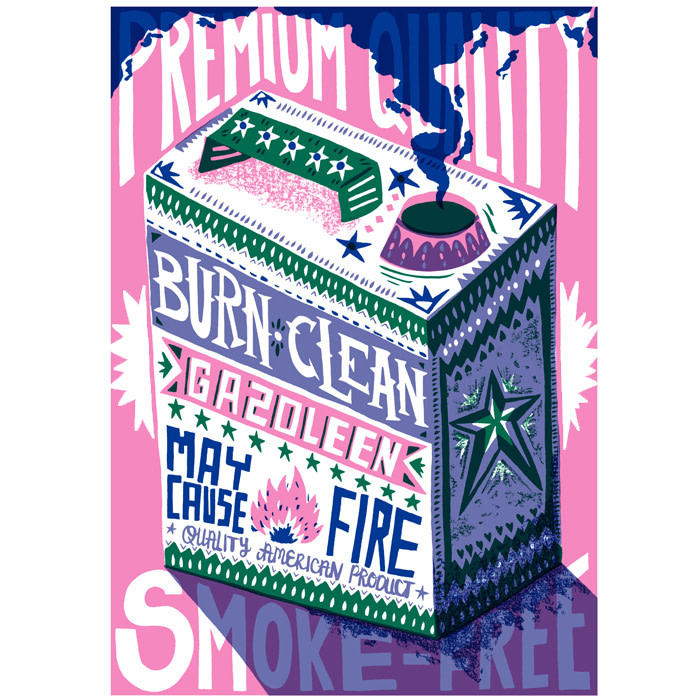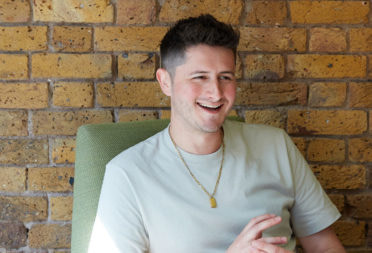Charlie Gould: a poster boy for print

Illustrator Charlie Gould tells MOO how he weaves a love of B-movies, printmaking, and American packaging into his unique poster designs.
Charlie Gould is a freelance illustrator and printmaker who specializes in poster design. Since gaining a degree in illustration from Southampton Solent University in 2016, he has worked as a freelancer, attracting clients including the cinema fanzine Shelf Heroes, Paper & Cloth Design Studio, and Australian singer-songwriter Courtney Barnett.
Inspired by his love of B-movies and American packaging, Charlie blends digital and tactile techniques to produce bold and colorful screen-printed posters, often using throwaway objects as a framing device.
We caught up with him to talk about his love of “films so bad they’re good,” taking the leap into freelancing, and the curious attractions of ephemeral art.
Tell us how you got into illustration and printing
I realised during my graphic design course at college that the disconnect between traditional methods [and working digitally] wasn’t for me. I like things to be tactile, and illustration and printmaking scratched that itch.
My campus had some amazing print facilities, and I wanted to get involved in that environment, so I asked my tutor if I could use them. He bluntly told me no, as I was on the wrong course. So from then on, I decided to focus exclusively on print, and to do the best work I possibly could. I like to think my tutor’s intention was to push me, but it definitely wasn’t!
I love how printing can give a whole new dynamic to a piece of work. Printing provides that extra spark which elevates it to more than the sum of its parts.
I follow the mindset that one color means one layer, which means all my work can be created either digitally or physically. Working that way comes with limitations, but also forces me to think outside the box.
What advice would you give to graduates considering going straight into freelancing?
I thought being freelance was a big part of being an illustrator, and jumped into it a bit blindly. I don’t regret it, because it gives me the opportunity to curate my clients and be responsible for everything from sourcing work to overheads.
But I’d definitely recommend graduates do their homework before doing the same – think about where you stand in the market, and what you can contribute. Try to generate some contacts before making the leap, and seriously consider finding another source of income – either just initially, or indefinitely.
It can take the stress out of finding clients, as long as you also use that as a positive energy to push your work and yourself further.
How did you attract your first commissions?
I’ve always been a big fan of mailouts, so when I started out I created packs including examples of my work to post to prospective clients – MOO circle Stickers, classic A6 matte Postcards, and Business Cards – I’ve recently ordered some new ones, and have chosen Raised Spot Gloss this time. I can’t see myself going back to standard Business Cards.
These packs were super-high quality, affordable to produce, and easy to distribute to people or companies who would hopefully commission me. MOO products have been massively helpful in attracting new clients to my work, as well as allowing me to show off a little and giving me bang for my buck, so I still do it semi-regularly.
I’ve also been told numerous times that people came across my work through channels I was involved in just after university – for example, I was invited by my university to display my work at D&AD New Blood after graduation. But it really boils down to being motivated to constantly produce work.
Tell us about the inspiration and influences behind your work
I have a real love of B-movies, classic slasher flicks and films that are so bad they’re good. I enjoy how these movies never conform to any standard – they’re always a bit weird and far-fetched, and completely represent the director’s vision.
The whole aesthetic of doing guerrilla-style work is very appealing to me. It removes expectations, and frees you up to produce work you’re personally pleased with, which is central to my concept of being an illustrator.
American ephemera from the 1890s to 1930s is also a massive part of my work. I’m fascinated by these wonderful, carefully designed pieces of packaging created just to be thrown away: not to be lauded for their design, but just to sell a product then be put in the bin. There’s something special about things that exist only to be thrown away.
How do you approach a client brief?
I like to get constant feedback from whoever commissioned me, and to be as collaborative as possible. I’ll start by asking why they’ve chosen me – there are always a couple of pieces that caught their attention, and I’ll springboard off that.
I’ll send over some concepts and invite the client to give as much honest feedback as possible. Afterwards, there should be a fully-formed idea there, so I’ll go ahead and make it. Because a lot of my work will end up as a screen-print, I like to provide some colour variants or slight design changes – which means I get to see more of my work out there in the world.
What’s been your favorite project to date, and what have you got coming up?
Because I’m picky in choosing who I work with, I’ve enjoyed every project – but the gig poster I did for Courtney Barnett stands out. It was my first-ever gig poster, for one of my favourite musicians, and everything that could go right, did.
My next dream commission would be working with [movie-poster illustrators] Mondo and producing a poster for Event Horizon, which is one of my guilty-pleasure movies. Joining such names as Matt Taylor, Daniel Danger and Dan Mumford would be a career highlight.
Next up, I’m planning to create and self-publish a book looking at some of my favourite directors and movies, with my own interpretation of the poster alongside each of them. So far, I’ve planned around nine posters, but I want to exceed my own expectations and produce at least 30. I’ve given myself a deadline of a year to get it done – so no stress…
Love posters? Posterzine talks about the future of print
Keep in touch
Get design inspiration, business tips and special offers straight to your inbox with our MOOsletter, out every two weeks.




















